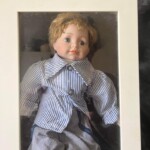It’s been nearly five decades since Richard Kiers fled the religious group The Move with just a shoebox of belongings, but he’s still processing the abuse he endured.
He was 10 years old when his parents joined the secretive sect which still has thousands of members and follows a doctrine of separation from the world.
Living on a commune, he was forced to build roads and homes by hand during 12 hour days of hard labour – told he’d burn in hell forever if he refused.
“I have no idea why my parents joined,” Richard, 64, from Edmonton, Alberta, Canada.
“We lived in a community just outside of New Market, Ontario, basically market gardeners growing vegetables.
“My dad went down to South Carolina, where he met with Sam Fife and other leaders, and when he came back, we were told we were leaving our church, school, and family, completely segregated from everyone.”
What followed was a difficult period for Richard and his brothers and four sisters.
The Move dictated every aspect of their lives, he says, and for Richard, that meant long hours of manual labor, minimal education, and psychological fear.
“For the first two years, we lived in Ontario and built our own school. But when we moved to northern British Columbia to the commune, school became less important,” he recalls. “We did correspondence school as little as possible because they needed us for work.”
Life on the commune was physically demanding. “When we moved there, there was no road into the farm we purchased. We had to build that road by hand, prepare the fields, and build cabins. There was lots of work to do,” Richard shares.
Children, including Richard, were expected to work like adults. “At 12 years old, we worked 12-hour days to stay ahead of the sun. Winter comes quickly in Alberta and northern BC, so we had to build cabins and roads. We were not allowed to be kids.”
Fife, the group’s leader, was revered by followers, but Richard’s view of him changed after leaving the group, he says.
“Sam Fife was basically worshiped. After I left, I met him and found out he was just a normal person – charismatic but controlling.”
Fife dictated strict rules that governed every aspect of life in The Move.
“He controlled who we could communicate with, what we could wear, read, or listen to — everything was dictated by him,” Richard says, noting Fife’s vision was enforced by a hierarchy of apostles.
Richard’s time in The Move was marked by a combination of physical and psychological abuse, which he details in his book Swindled by Faith.
“The physical abuse was extreme. Corporal punishment was common — lots of spankings, beatings, and serious punishment,” he said.
The psychological abuse Richard endured was centered around fear.
“We were told every day that if we didn’t listen to the rules, we would go to hell. Hell was this terrible place where your skin would melt off and you’d burn forever. We were terrified.”
Start and end your day informed with our newsletters
Morning Report and Evening Update: Your source for today’s top stories
Thanks for signing up!
He also witnessed the toll this environment took on his father. “My dad became very ill, and we were told it was God testing his faith. They refused to take him to the hospital. I remember the fear of that very clearly.”
At 15, Richard was deeply depressed and struggling to find a way out. “I didn’t believe in what they were preaching anymore. I tried to find ways to get out, like getting a job off the farm, but they wouldn’t let me leave,” he says.
Feeling trapped, he attempted suicide.
“I tried to hang myself, but the rafter broke. I suddenly realized I didn’t want to die — I just wanted to escape. So I packed a little shoe box with a set of clothes and headed for the hills in minus 30 degree weather,” Richard says.
“I walked three and a half miles to the highway and hitchhiked into town and went to Edmonton.
“My family all left over the next two to three to four years,” he says. “They all left after I did.”
Richard’s departure from The Move signaled the beginning of a mass exodus of young people from the group. “A whole bunch of young people started leaving after I did, and the group fell apart after that,” he says.
Today, The Move has dwindled to around 4,000 members, according to reports online – a far cry from the 44,000 during its peak.
Reflecting on his experience, Richard advises caution for anyone considering joining a similar group.
“If you’re thinking about joining any group, religious or non-religious, pay attention to how the children are treated,” he warns. “Children always seem to suffer the most in these groups.”
Now, years later, Richard has found peace and happiness. He’s raised three sons and rebuilt his life as a contractor in commercial construction, but acknowledges the lasting impact of his time in The Move.
“Relationships have been tough. You don’t learn about communication, compassion, or love in a cult,” he explains. “Now I’m full of love now, and I have lots of great friends. I’m doing very well, and I’m not suffering anymore.”






